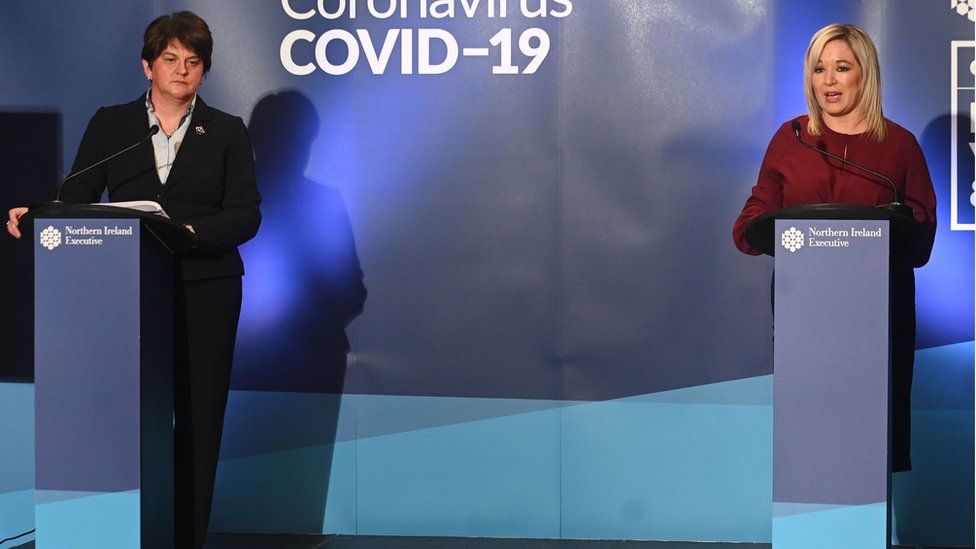Coronavirus: Northern Ireland charts its own way out of lockdown
- Published

In Northern Ireland a fall in the rate of new coronavirus cases to fewer than 50 a day has allowed contract tracing to be resumed.
Robin Swann, Health Minister in the devolved government told BBC Newsnight that the, "very low number of positives", had meant the resumption of tracing re-started this week.
Under the blueprint for recovery unveiled earlier this month by First Minister Arlene Foster, Northern Ireland is now charting a path distinct from the rest of the UK, and indeed the Republic of Ireland.
"I'm not surprised in many ways that we have deviated from the plan for England", Alliance Party leader Naomi Long told BBC Newsnight, citing the need for a distinct approach in the province and the lack of clear advice from Prime Minister Boris Johnson.
The Northern Ireland Executive estimates the R value or reproductive rate of the virus to be 0.7, which is higher than the reported rate in London, a fact some are using to justify the cautious pace at which the province is lifting the lockdown.
Businesses have questioned the lack of specific dates for reopening in Ms Foster's recovery plan, and schools may remain closed for months longer than in England.
Some in the First Minister's Democratic Unionist Party have accused her power sharing partners in Sinn Fein of blocking a faster return to normal.
Interviewed by BBC Newsnight, the Sinn Fein leader and Deputy First Minister Michelle O'Neill emphasised that the party was putting people before profit, as well as following World Health Organization advice, "so if taking the lead and trying to do the right thing is what I'm about, that's why I'm here".
As a result, the power sharing government - which embraces five political parties - is taking a distinctive approach.
In England, people have been advised that they can only meet one person outside of their household, in the open air, for a socially distanced chat, while in the Republic of Ireland this can be up to four people. Northern Ireland has however allowed groups of up to six people who do not share a household to meet outdoors. That example is an unusual one though in being more liberal than in neighbouring jurisdictions.
Many businesses in Northern Ireland are worried that they have no idea when they will be able to get back to work.
Judith Owen, who runs the Titanic Belfast museum, one of Northern Ireland's biggest tourist attractions, told BBC Newsnight, "it's really important for us to get guidelines, but a timeline has to be part of that. We need to know when it is that we can get open". She worries that many businesses in the tourism sector are on the edge.
The pandemic has proved to be a baptism of fire for the power sharing devolved government at Stormont, which only resumed in January after years of political deadlock between the DUP and Sinn Fein. But some have seen in the threat posed by coronavirus, a chance to redefine politics, even if doing so requires moving at a measured pace.
"It's brought in a level of challenge of normal politics that I think was actually needed in Northern Ireland", reflects Robin Swann, a Unionist member of the Assembly as well as Health Minister, "it's something that all the parties in Northern Ireland can actually unite around… to get this virus out of Northern Ireland and save as many lives as we possibly can".
Devolution has made possible these political developments, just as it has Nicola Sturgeon's adoption of quite different policies in Scotland. And, indeed, many in Stormont feel that Scotland's independence in this regard provided useful cover for Arlene Foster.
However hotly debated the different policy approaches might be though, there is evidence that geography as well as other epidemiological factors such as population density, age structure, international visitors or transport networks may have saved Northern Ireland from the worst of this pandemic.
While the UK as a whole has suffered 54 Covid19 deaths per hundred thousand, in Northern Ireland this figure is 38, not that much higher than Irish Republic's 33.
When other factors or metrics such as excess death are included, "the outcomes seem to be very similar North and South", says Professor Stuart Elborn who has led the response to the virus at Belfast's Queen's University.
- Published12 May 2020
- Published27 October 2020
- Published22 May 2020